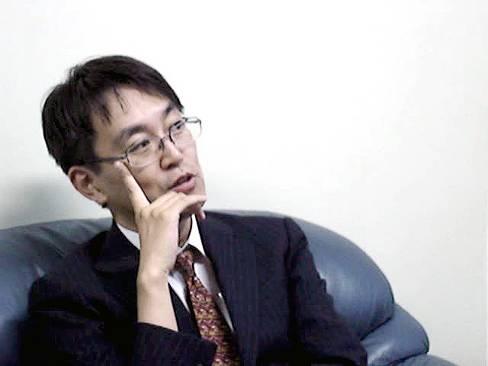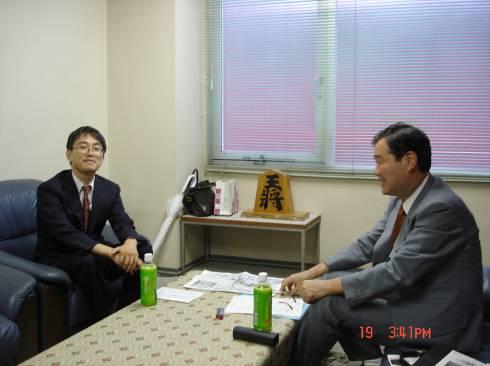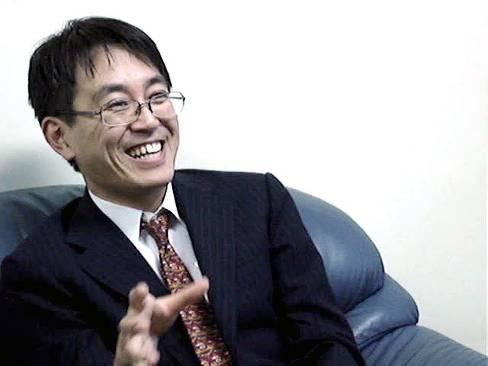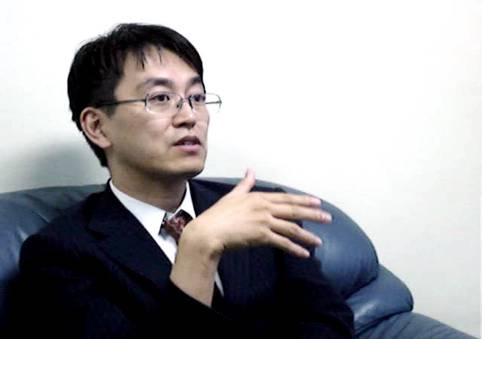An exclusive interview with the 19th Perpetual Meijin Yoshiharu Habu
Lighting on a new spark
Interviewer : Nobuyuki Matsuoka, the editor
Mr. Yoshiharu Habu has assumed the title of the 19th Perpetual Meijin by winning in
the Meijin title game of the year 2008. The International Shogi Popularization Society
(ISPS) asked his views on the significance of his title and on the means of internationally popularizing the game of Shogi. The interview took place on September 19, 2008. (This is originally a interview published in Kakehashi Volume 45 in Japanese. Translation into English done by Iwao Nishiumi)
Editor
First of all, congratulations on your success in winning the title of the 19th
Perpetual Meijin. When I attended your inauguration ceremony, I noticed that
you showed more sign of tension than usual.
Habu
The Meijin title game 2008 attracted so much attention that really a great
many number of people came to the inauguration. That gave me a heavy
sense of responsibility.
Editor
Has that tension contributed to your brilliant victories?
Habu
I don’t know. However, I look forward to playing the coming Ryuoh title game, as this is the first time that the winner will be entitled the Perpetual Ryuoh.
Editor
The first title game will be played in Paris, is that right?
Habu
I’ll be staying there for the first time in many years.
Editor
Mr. Homma, a 6th dan professional , resides in France with a view to spreading
the popularity of Shogi in France. Does the Japan Shogi Association (JSA) consider Paris as a good base for its popularization in Europe?
Habu
He seems to live in Paris as his base, I hear that the game of Go is very popular in France and that the salons of Go also have Shogi boards. Therefore, I believe that Shogi has a good chance to becoming more popular there.
Editor
You went to Beijing this year to participate in the meeting of the Asian Intercultural Shogi Exchange Program (AISEP) following 2007. Did you play Shogi on these occasions?
Habu
No, I have never played Shogi there. I went there in order to deepen friendship with the Asian students and to research the cultural background of Shogi.
Editor
What was your impression about their activities?
Habu
I felt that they “were quick to act”, because they had the second meeting in July following the first one in August 2007. It was remarkable that they did so
with such a short interval to prepare.
As it was just prior to the Olympics, any assemblies were regulated. The students faced a considerably high hurdle, as all cultural activities had been banned since July. However, to my surprise, the participants were so highly motivated and capable that they were able to communicate with one another very speedily using portable telephones. They made decisions one by one and advanced forward. I was impressed with their practical capabilities. On my arrival there, I found that a number of networks had been established among the Japanese students. Everyone was very positive in their activities with remarkable vitality. One after another there emerged peoples who were willing to work as the core of the organization.
In addition, a Shogi professional called Taichi Nakamura participated as a student of Waseda University. As there are a few university students who are qualified as Shogi professionals as well, I feel the possibility of establishing a new network.
Editor
Beijing was the right place for you to visit, since the Shogi population is increasing explosively in China.
Habu
I agree. Mr. Xu Jiandong and Mr. Li Minsheng live in Shanghai and Beijing
respectively, which means there already exists a great base. There is plenty of good competition inside China. Good internal competition should be very much welcomed. Also, Toyota Tsusho and other Japanese companies are cooperative, making it highly feasible for Shogi to spread.
Editor
In listening to you I get excited at the prospect of a great step forward. While you talked about the companies which have offices or factories there, I think that Shogi can play a role in communication with the local nationals.
Habu
That may be the case. You can initiate talks by mentioning about Shogi.
People tend to be excited when talking about history or sports, but talking about Shogi doesn’t get them emotional. Shogi can be a good subject to start a conversation.
Editor
Would you tell me your view about what it means to spread Shogi internationally?
Habu
In contrast to the stereo-typed image of Japan represented by Samurai or Geisha, Shogi should be suitable for presenting to foreigners as part of our real
image. Particularly, since every Asian country has its own Shogi, the communication should not be unilaterally from Japan to Asia but bilateral. Acknowledging a common culture helps to promote national pride and mutual understating.
Editor
You mean that peoples can get to know the basis of culture and recognize common traditions through Shogi.
Habu
I am sure that through Shogi the multiplicity of Asia and its cultural interminglement will be recognized.
Editor
It is wonderful that Shogi is useful as a means of promoting mutual understanding.
By the way, what does the Japan Shogi Association consider about its international popularization?
Habu
I am not in a position to answer for the JSA. However, it is holding the 4th
World Shogi Forum in 2008 which means it is always considering ways to spread Shogi internationally. Actually, as it is not a big organization, it has no capacity to expand its activities overseas, I assume. I think it is important for the JSA to understand the activities of people who are engaged in spreading Shogi internationally, to support them and to grasp firmly what is going on.
Editor
There seems to be a delicate problem in the JSA such as the position of the overseas branch in its organization.
Habu
I think that the JSA is intent on solidifying its domestic basis, because it has
not yet been well organized at the prefectural level. However, the world population is overwhelmingly greater than that of Japan. Therefore, when the world-wide Shogi population increases to a certain level, I expect a great exchange will take place on the subjects such as what Shogi should be in the world, how to spread it, or how the organization of the JSA should be.
Editor
Like when a chemical reaction is just about to takes place?
Habu
Exactly, there would be a chaos should “The Shogi Sekai” magazine begin to sell all over the world. (laugh)
Editor
Now World Mind Sports Games is being planned. The games of higher
international popularity seem to solidify its presence. How do you find the
position of Shogi compared to other mind-sports? In case of Chess, which is popular world-wide, the number of professionals who make a living on it is just about 60. By contrast Shogi has 200 salaried professionals in just one country Japan, to whom the JSA pays salaries. What a dense organization! Shogi’s isolation in the world gives me a sense of anxiety for its future,
Habu
I am more interested in the Olympics than World Mind Sports Games. A strategy for the Shogi may have to be established with a long term view.
In case of Chess, the FIDEwhich corresponds to the FIFA in soccer operates as its center. However, it leaves activities to each region. Such a loose organization is effective in spreading the game. On the other hand, each professional has to find amateurs to take his lessons. A solid organization may not be suitable for external activities.
Editor
The example of Chess or the professional teachers of golf is worth considering, isn’t it?
Habu
First of all, I would like to see a very successful case.
Editor
Where do you think the emphasis should be put in spreading Shogi internationally?
Habu
It seems that it is difficult for the board game like Shogi to become very popular in the developed countries.
Editor
Why?
Habu
In a sense, the facts prove that. In the developed countries people spend much time on their job to live. In the developing countries there seems to be more possibilities of spreading. While peoples’ lives are hard, they may have more time for leisure which offers the potential for Shogi to spread. That is worth considering in determining where to target.
Editor
What do you think of the Internet in relation to spreading Shogi? You appear to imply that spreading efforts should be focussed on countries where people cannot afford to have computers.
Habu
In Japan where the atmosphere surrounding the Internet is excellent, the Internet is very effective in spreading Shogi. In the international field human presence should be essential at the initial stage. However, I found an exception in Beijing this year. A Malaysian student participated on his own. In the circumstances where Shogi is totally unknown, he learnt it through the Internet, improved himself and came to the meeting. Thanks to the Internet, an amateur of the Shogi was born. There exists a possibility that Shogi spreads in an unimaginable circumstance.
Editor
I heard that Microsoft plans to sell the “X Box 360” a Shogi software translated into 7 languages except Japanese. Would it help in spreading Shogi?
Habu
Mr. Bill Gates plays Go. He may understand about Shogi, Nowadays a Japanese airline offers in-flight the software to play Shogi. With the software available in multiple foreign languages, the number of people who are interested in Shogi may increase all the more.
Editor
Finally, what do you suggest to ISPS including its collaboration with the JSA?.
Habu
Personally, I think it very much worthwhile that Shogi will spread all over the world and that the number of people who enjoy playing Shogi will increase. I look forward to seeing that being achieved. At the same time, the most important thing is that the ISPS or the people engaged in the job enjoy the work, find it worthwhile and that they are willing to spend more time for the purpose. You need not try to make the Shogi population increase too rapidly. Continuing to work for a long time, say 10 or 20 years is important. In order to continue for a long time you have to be sure that the work is worthwhile and enjoyable. I am of the view that that is where the JSA can give you most support.
Editor
Like a marathon runner you mentioned in your inauguration as the Perpetual Meijin.
Habu
I have an impression that the ISPS is really very well staffed. You have a number of experts unimaginable in ordinary NPOs. I hope that you will concentrate your efforts with Mr. Sanada, the president as a core. Collecting and sharing information is essential for the sake of the next generation. I look forward to seeing the ISPS strengthen its role as the center of information in popularizing Shogi internationally.
Editor
Thank you so much for your very meaningful talk. I believe your ideas will be very valuable for the future of the ISPS and for the world of Shogi. I look forward to your continuing success.




Can you inform me what system are you using on this site?
Posted by: Gerardo | March 23, 2019 at 09:41